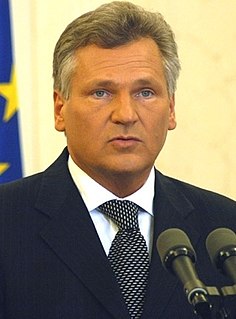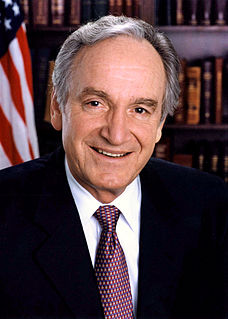A Quote by Peter T. King
In the post-9/11 world you cannot give him the benefit of the doubt. As a result of our going into Iraq, not only is Saddam Hussein gone, but Qaddafi has given up his weapons of mass destruction and tremendous progress is being made in Iraq.
Related Quotes
Imagine a world in which you had Saddam Hussein, who had the capacity to make a weapon of mass destruction, who was paying suiciders to kill innocent life. Imagine what the world would be like with him in power. The idea is to try to help change the Middle East. Part of the reason we went into Iraq was we thought he had weapons of mass destruction. It turns out he didn't, but he had the capacity to make weapons of mass destruction.
There is no question that Iraq possesses biological and chemical weapons and that he [Saddam Hussein] seeks to acquire additional weapons of mass destruction, including nuclear weapons. That is not in debate. I also agree with President Bush that Saddam Hussein is a threat to peace and must be disarmed, to quote President Bush directly.
Whereas Iraq has consistently breached its cease-fire agreement between Iraq and the United States, entered into on March 3, 1991, by failing to dismantle its weapons of mass destruction program, and refusing to permit monitoring and verification by United Nations inspections; Whereas Iraq has developed weapons of mass destruction, including chemical and biological capabilities, and has made positive progress toward developing nuclear weapons capabilities
Iraq does pose a serious threat to the stability of the Persian Gulf and we should organize an international coalition to eliminate his access to weapons of mass destruction. Iraq's search for weapons of mass destruction has proven impossible to completely deter and we should assume that it will continue for as long as Saddam is in power.
It remains our policy to change the regime until such time as the regime changes itself. So far, we cannot be sure that he is cooperating or he [Saddam Hussein] is acting in a way that could give us comfort, or should give the international community comfort, that he is giving up his weapons of mass destruction. He continues to give us statements that suggest he is not in possession of weapons of mass destruction when we know he is.
Without question, we need to disarm Saddam Hussein. He is a brutal, murderous dictator, leading an oppressive regime ... He presents a particularly grievous threat because he is so consistently prone to miscalculation ... And now he is miscalculating America's response to his continued deceit and his consistent grasp for weapons of mass destruction ... So the threat of Saddam Hussein with weapons of mass destruction is real.
Change of regime with respect to Iraq had nothing to do with this; it had everything to do with the fact that Iraq had weapons of mass destruction. And at the time change in regime as a policy came into effect in 1998, it was seen as the only way to compel Iraq to get rid of its weapons of mass destruction.
We must recognize that there is no indication that Saddam Hussein has any intention of relenting. So we have an obligation of enormous consequence, an obligation to guarantee that Saddam Hussein cannot ignore the United Nations. He cannot be permitted to go unobserved and unimpeded toward his horrific objective of amassing a stockpile of weapons of mass destruction.






























